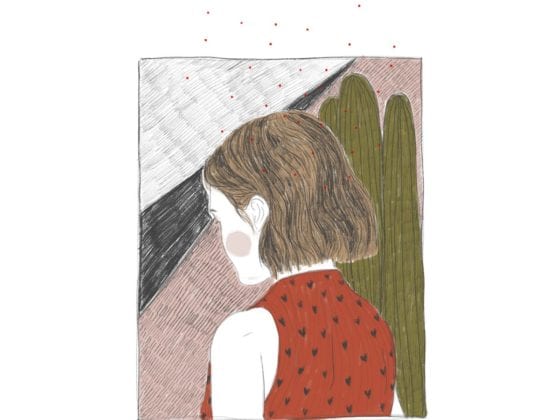Every day there are women (and men) all over the world fighting for justice for the marginalized and unseen. You won’t find them on the popular pages of social media. You won’t find thousands of hashtags with their names. But step into some of the darkest corners of the planet and the unyielding light you’ll find there will be thanks to their flame — IJM‘s flame, to be more specific.
Darling partners with IJM to support their work combatting sex trafficking, specifically in the Dominican Republic; however, since IJM works all over the globe to bring dignity and freedom to the vulnerable, we wanted to highlight a few specific women who are working to make that possible.
For this series, IJM Media and Communications Intern Kelsey Brown interviewed three strong and inspiring women who are using their unique gifts and passions to fight modern day slavery with IJM.
Meet: Brianna Gehring, Regional Program Manager, Southeast Asia

What is your role within IJM?
Brianna: I’m one of the regional program managers for Southeast Asia. My job looks different day to day, but I support the programs in the field by helping the field office teams with program design, case work strategies and system reform strategies. Basically, I help [the field offices] do what they do.
Were you always drawn to work in human rights? How did you get to IJM?
Brianna: This is kind of a long story. I wanted to be a high school history teacher, and when I was in undergrad I was learning about people who had seen some sort of injustice in their time and decided they were going to do something to change it. They really ended up changing the course of history. Super idealistically, I was like, “I want to be one of those people. I don’t want to just talk about them or read about them, but I want to be one of those people.”
From there, I somewhat randomly ended up in Cambodia working at an aftercare center for girls rescued from trafficking. I was 21 and I didn’t really know what I was doing. I kind of thought, “I’m just going to go and love people and that’s going to make a difference,” when in reality it was much harder than I thought and heartbreaking to see up close.
[That experience] shaped me a lot and working at an aftercare center was like being at the end of a pipe. The pipe had broken somewhere further up, and it was continually spilling out this mess. Unless someone could go turn off the nozzle, it was going to keep happening. That’s kind of what brought me to IJM; I wanted to be part of solving the problem and stopping the flow of trafficking.What does your day to day look like?
Brianna: Because I work with Southeast Asia, I spend a lot of time working weird hours. Usually, my day starts around 7:30 a.m. with a phone call talking to staff in the Philippines when it’s night time in Cambodia, because that’s one of our only chances to connect.
I then have a time of stillness from 8:30-9:00, usually at a coffee shop listening to music. Then, it’s off to the races from there! I usually have a ton of meetings during my work day focused on external groups working on trafficking and finding ways to collaborate with them. We communicate IJM’s theory of change, what we’re doing and how everyone can fit into what we’re doing. I do a lot of work on budgets and grant applications, as well.
How do you maintain hope and positivity in a field dealing with violence every day?
Brianna: Several thoughts. Number one: One of the biggest programs I support is the online sexual exploitation of children program, which is really, really dark and heavy to think about. But, my job gives me this very unique perspective where even though I’m hearing these individual stories, I also have the fuller picture of the story arch. I know this story because IJM intervened to rescue them.
Because we rescued them and are working to arrest their perpetrator, we’re strengthening the justice system so there will eventually be children who aren’t exploited in the first place. This actually helps me feel more positive and more hopeful than if I weren’t doing this work.
… we’re strengthening the justice system so there will eventually be children who aren’t exploited in the first place.
What is the most challenging part of this work? The most rewarding?
Brianna: There are two main challenges. First, hearing individual stories of children who have been abused and who might even have to be removed from their family – because their families were actually committing the abuse in the first place – is heartbreaking. It affects how I feel when I see kids – my own nephew even – and it makes my heart hurt.
The second challenge is always feeling like there’s more to do because this work is so compelling. Everyone’s so committed to it, so I have to set good boundaries on when to stop working because I’d just work all the time if I didn’t.
On the other hand, I’ve been at IJM for nine years now. Because I’ve been here for so long, I’ve gotten to see the longer story arch of things that felt very insignificant at first or felt like they weren’t contributing to very big change, and how those actually impacted big things in the end. We can look back and see, “Oh – this thing we did actually had this impact or contributed to this thing years down the road, and we would’ve never known.” I like being here long enough to see these big changes.

What do you wish the majority of people knew about international slavery and violence?
Brianna: I wish Americans knew slavery is a solvable problem. People hear about our work, that we’re fighting trafficking and slavery, and they think it’s such a big problem or it’s hopeless. But, there are actually things we can do that will stop it and we have proven models.
With our work in Cambodia, we’ve seen an incredible transformation in child sex trafficking, where children used to be openly sold for sex on the streets and now it’s significantly reduced – basically eradicated. There are still some minor issues, but the government now responds to protect children. Similarly, in the Philippines children were openly exploited and now we’ve done studies that show a reduction between 75 and 86 percent in children being exploited. So, it’s solvable.
… in Cambodia, we’ve seen an incredible transformation in child sex trafficking…now it’s significantly reduced – basically eradicated.
Talk about a specific day or event at IJM you felt was particularly moving or significant.
Brianna: I originally moved to Cambodia to work for an aftercare partner when I was 21. I didn’t really know if I was actually contributing to anything or making a difference. I’ve also had a bunch of random roles at IJM, where I helped coordinate training programs or support our investigators, and now I help manage the program in Cambodia.
When I was in Cambodia last time, we transitioned our work there from combating sex trafficking to combating labor trafficking because we saw such an improvement in sex trafficking. The team was holding a little celebration and they were thanking me for the work I did. The director of legal, this amazing Cambodian attorney who’s been with the organization for over 10 years, was thanking me and he said in front of the whole team, “You are a part of the change in Cambodia.”
It made me start crying because I had always wanted to be a part of the change, but I didn’t know if I actually made a difference because my little contributions seemed so small over the years.
Proof that little change always leads to big change. Stay tuned for our second interview and to learn more about IJM visit www.ijm.org!
Feature Image via Madeline Heising












2 comments
As someone who investigates the financial end of crimes like these, reading about how people like Brianna and organizations like IJM are making relational and societal differences is very encouraging. Thank you for being a bright light in a dark world.
I loved that little story of the team thanking her. Every little bit counts!
–
Charmaine Ng | Architecture & Lifestyle Blog
https://charmainenyw.com